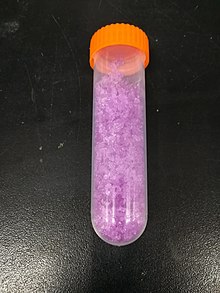Neodymium nitrate

| |
| Names | |
|---|---|
| Other names Neodymium trinitrate | |
| Identifiers | |
| |
3D model (JSmol) |
|
| ChemSpider | |
| ECHA InfoCard | 100.030.127 |
| EC Number |
|
PubChem CID |
|
CompTox Dashboard (EPA) |
|
| |
| |
| Properties | |
| Nd(NO3)3(H2O)x | |
| Molar mass | 330.25 g/mol (anhydrous) 438.35 g/mol (hexahydrate) |
| Appearance | vibrant pink/violet solid |
| Density | 6.5g/cm3 |
| Melting point | 1,374 °C (2,505 °F; 1,647 K) |
| Structure | |
| Tricapped trigonal prismatic (nine-coordinate) | |
| Hazards | |
| GHS labelling: | |
 
| |
| Warning | |
| H272, H302, H312, H315, H319, H332, H335 | |
| P261, P264, P270, P271, P280, P301+P312, P302+P352, P304+P312, P304+P340, P305+P351+P338, P312, P321, P322, P330, P332+P313, P337+P313, P362, P363, P403+P233, P405, P501 | |
Except where otherwise noted, data are given for materials in their standard state (at 25 °C [77 °F], 100 kPa). | |
Neodymium nitrate is an inorganic compound with the formula Nd(NO3)3·(x(H2O) . It is typically encountered as the hexahydrate, Nd(NO3)3·6H2O, which is more accurately formulated as [Nd(NO3)3(H2O)4].2H2O to reflect the crystal structure.[1] It decomposes to NdONO3 at elevated temperature.[2]
It is used in the extraction and purification of neodymium from its ores.[3]
References
- ^ Rogers, D. J.; Taylor, N. J.; Toogood, G. E. (1983). "Tetraaquatrinitratoneodymium(III) dihydrate, [Nd(NO3)3(H2O)4].2H2O". Acta Crystallogr. C. 39 (8): 939–941. Bibcode:1983AcCrC..39..939R. doi:10.1107/S0108270183006927.
- ^ Van Vuuren, C.P.J.; Strydom, C.A. (1986). "The thermal decomposition of neodymium nitrate". Thermochimica Acta. 104: 293–298. Bibcode:1986TcAc..104..293V. doi:10.1016/0040-6031(86)85204-2. ISSN 0040-6031.
- ^ McGill, Ian (2000). "Rare Earth Elements". Ullmann's Encyclopedia of Industrial Chemistry. doi:10.1002/14356007.a22_607. ISBN 978-3-527-30385-4.
